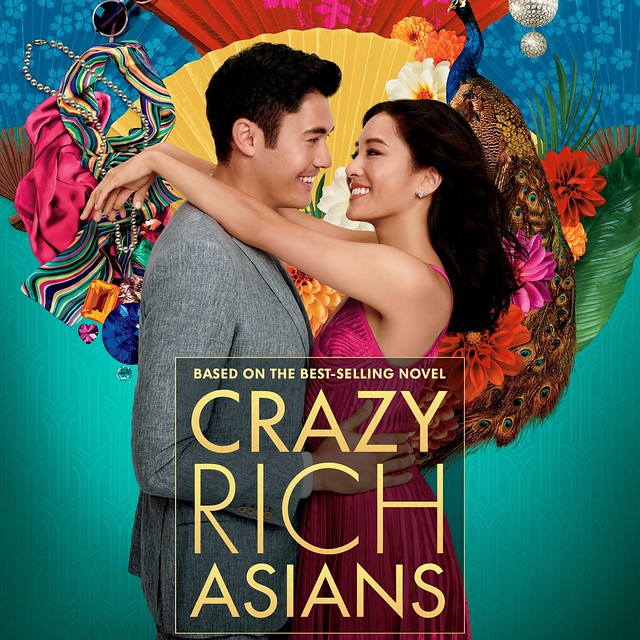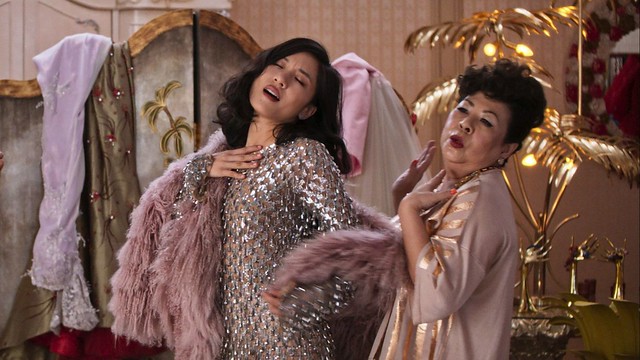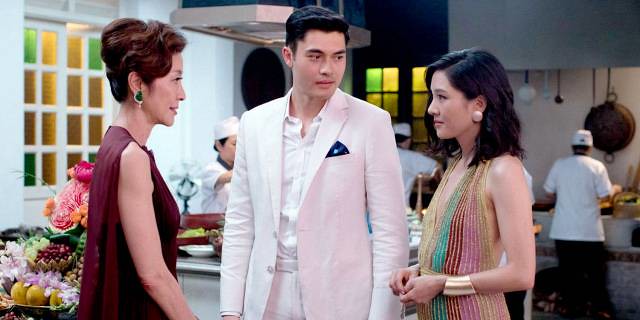Hey guys,
So I thought for a long time before writing this post, but here I am regardless.
I don’t know Henry (who plays the main character of Nick Young) personally but he’s appeared on Click before, and I know his wife, Liv, from yoga and etcetera. I absolutely adore Kheng Hua (she plays Rachel’s mother), who I’ve watched onscreen and also met on set for a shoot last year. I also work with Singapore Tourism Board regularly and I assume they are obviously thrilled at the front and center visual representation of Singapore (and to be sure, we do have pretty crazy ass things here). When I produced the Laneige film last year, my art director was from the art department of the Crazy Rich Asians set. Anyway all this is to say that I have very personal and compelling reasons to support the movie and it is all the more frustrating that I am hesitating to do so. And everyone is so, so excited about the CRA movie that I almost feel as though to say something against the movie would be a betrayal of my own community, many of whom are understandably excited to see things about their home that they recognise in a glitzy Hollywood movie.
I am hesitating for the same reasons everyone who is hesitating is. The movie is fun but not perfect. The gap of its imperfections are unavoidable (for nothing is perfect) but still important to acknowledge. When I was thinking about writing this post I asked myself: what can I honestly bring to the table, is it necessary for me to add my voice to an already noisy conversation, is there anything new I can say that would not be completely superfluous?
And the truth is, I actually think the movie was really well done in terms of entertainment. Narratively I wish there were some beats it hit properly, but still it’s fun, dramatic, and over the top in the super extra way chinese families can get. Constance Wu is one of my favorite actresses (fresh off the boat is basically the only show I ever watch on flights) and you cant even tell that it’s Golding’s first acting role. I have zero problems with Golding’s British-Malaysian mixed heritage, which has gained some flak online, because the truth is there are many mixed blood people in Singapore and so what if he’s half white? Being Singaporean is a nationality not a race, and you can be from wherever and still be authentically Singaporean if you were born and raised here. (He’s half-Malaysian but the point stands.) The movie doesn’t pretend to be what it’s not – it doesnt pretend to be a socio-economic documentary on Singaporean culture, and yes, it’s satirical, it’s supposed to be a fluffy rom com anyway.
But that doesn’t change the fact that the phenomenon of Crazy Rich Asians has created a giant international conversation that has reached far beyond its intended genre, and so hiding behind the “it’s all for fun anyway” dismissal doesn’t hold water. The discussion has to be had.
The movie’s production was energised by an overwhelming desire for Asian-Americans to see themselves onscreen after a long history of being underrepresented and stereotyped, and a friend pointed out that the casting of an Asian-American director in itself should have set our expectations: the movie is for Asian Americans, not for us. And in that aspect, it is a huge win for that community. But you cannot include a side character (in this case, the whole country of Singapore) and then expect that side character to hold her tongue about how she has been portrayed. I found myself laughing and genuinely enjoying moments in the film but also feeling great discomfort at other points. The particularly problematic scene that aimed for humour by leveraging the bodies of two Sikh guards, for example, becomes especially ironic when you consider the fact that this is a film trying to fight for the representation of a marginalised culture, and it has come to a country that similarly struggles with ethnic tensions only to visually reinforce the class privilege of the Singaporean equivalent of white people. I also didn’t like how the movie’s story was basically an Asian American protagonist coming to Asia to tell us how our Asian cultures and values were wrong. Things like clanship and the idea of family before self are big things in Trad-asian culture, but they were exaggerated and villainized in the movie as a foil to the protagonist’s love story. Not saying that they are perfect practices and ideas, but for an AsAm director to use it as the main villain in his story is kind of like going to your friends house and saying their mother’s cooking is not nice, you know?
So yes, I like things about the film, but I also have issues with it. That is fine because we can hold more than one opinion at a time, we live in a nuanced world. But one cannot just criticize, one must provide solutions or direction, or the whole conversation goes nowhere. I ask myself: with all the totally valid wins and criticisms the movie is facing right now, what could the director feasibly have done differently?
Perhaps the sassy best friend character could have been played by a non-Chinese actor (Singapore has plenty of excellent ones, and in Southeast asia? More.), and given proper character development. Perhaps there could have been a bit more self awareness when it came to portraying the class politics onscreen. Perhaps, like, just don’t use dark Asians as a prop or joke.
With that said, I recognise the limitations of the movie – there is only so much it can do when based off an even trashier book that parades an ensemble cast of walking stereotypes and caricatures. And I also recognize that a film’s priority is in the storytelling / entertainment value, not in social commentary, especially since it’s a rom-com. If there is no way they could have responsibly navigated the politics of SEA representation, part of me does think it’s better that they don’t attempt it than that they do it in a damaging manner. Personally I think the best thing the movie’s team could have done would have been to apportion a significant part of their marketing budget to work with major news outlets to use the movie as an opening for a larger conversation on representation in all its nuances, not just AsAm w.r.t. Hollywood, instead of marketing the movie as a straight up representation win. These things can and have been done, and if the movie’s campaigning (separate from the actual film content) was to be so focused on the concept of representation then it absolutely should have been on the list to do this. The supporting media to any pop culture article is very important because it creates a subconscious guideline that the general public takes cues from in forming their own impressions of the movie, so there needs to be some handling of this responsibility in a, well, responsible manner.
Western media outlets would also have benefited greatly from a perfunctory dissection of what the Asian experience is internally to inform their movie coverage – one gets the sense when reading articles produced from the USA that there is a major problem trying to differentiate Asians in Asia from Asians in America. Look, someone who grew up in Southeast asia does not share the same experience as someone who grew up in East Asia. Someone who grew up as a child of immigrants in America does not share the same experience as someone who was born in Asia then moved to America for work or school. I have so many friends who are Asian Americans who struggle with issues that are real and complex. Those issues are significantly different from my Asian (by heritage) friends who were born and raised in parts of Europe. Both of these experiences are also different from the experience of an ethnically Chinese person vs an ethnically Malay person vs an ethnically Indian person vs our famously labelled ‘Other’ person who grew up in Singapore. Yes, there are commonalities in all these experiences – the tiger Mom stereotype, the expression of love through food, the idea of familial currency that consists pressure and expectation. But they also differ in many other ways. Lets have some responsible reporting is what I am saying. And it wouldnt have been a far stretch to expect Crazy Rich Asians to use some of their marketing budget to enable this.
Also, Western Media, stop calling CRA the asian black panther! The comparison to Black Panther is problematic. Black Panther was based in the fictional state of Wakanda, and the implications of representation become more meaningful and impactful when you map the Wakandian experience onto black culture, much like re-writing a narrative symbolically. Whereas Crazy Rich Asians is based on the culture of an actual, real place, which has been flattened into a singular idea of the rich, chinese, asian. And then this idea, which represents only a fraction of Singapore (a multiracial/cultural country that, while having equality built into its national ethos and pledge, still struggles with limited inclusivity), is taken and flattened further into a backdrop for an Asian American girl’s Cinderella story.. I wont go so far as to say that it is a win for Asian Americans at the expense of actual Singaporeans. But likening it to Black Panther is a bit much.
Where does this leave us? I dont expect Crazy Rich Asians to answer all the questions for us. I dont think the burden should be on the movie to represent one million different types of Asians, and it is not the job of the director or the author (who I understand is from a crazy rich family himself and therefore writes from his own experience, okay, fine) to represent everything about singapore. It is a romcom, not a politically charged film. Yes, it is a huge accomplishment. But it is also a conditional accomplishment, for some people by ignoring other people. This has led to a lot of fired up arguments and online wars between people who think we should just let AsAms have their moment and stop being butthurt about a watershed moment in Hollywood history, and people who think CRA is the worst thing to have happened to Singapore. Let the wars happen, I say. The fact that the conversation is happening is important and good. We are ready for the war. We can take it. Bring it.
Representation is starting to feel like an end-all term rather than an element that can vary in comprehensiveness. There is space to celebrate the win for asian american onscreen representation, hollywood’s slow movement towards diversity, and still acknowledge that there are ways to go in creating nuanced representations of cultures residing outside the Americas, especially if you are leveraging that specific culture to give your piece a unique spin. There needs to be more acknowledgement that diversity is not the same thing as representation. There are ways to do this that can be uplifting as well, ways to commend the movie for what it has done while using the opportunity to shed light on the cultural nuance of the country that didn’t make it into the film. There needs to be more stories – Crazy Rich Asians cannot be the only story about Singapore, about Asians, about Asian Americans – and we need to enable storytellers, be they filmmakers or writers, to come forward and tell these stories so that one day we will have a tapestry of multicolored and textured stories from Singapore, et al, and not just this one story that is expected to do everything. We need to encourage, fund, and make possible the production of these stories, while not dismissing the progress each step has made. Because, yes: Crazy Rich Asians is the first step. But we have a hell of a way to go.
x
Jem




